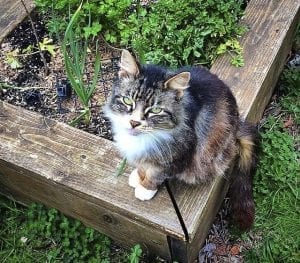VANCOUVER — Animal control experts estimate that there are 60,000 to 70,000 feral cats living in Clark County right now.
“These cats are different than pet cats,” Lisa Feder, vice-president and director of shelter operations at the Humane Society of Southwest Washington told the Vancouver City Council in late November, adding that feral cats tend to be antisocial, wanting little to no human contact, which makes them extremely difficult to adopt out to the general population.
In 2015, of the 2,332 stray cats that the local Humane Society took in, only about 3 percent were claimed by their owners, Feder says. The rest were true strays and many were considered feral, meaning they wouldn’t tolerate human contact.

“There’s not a lot of options for feral cats,” Feder explains. “If we can’t touch or feed a cat, there aren’t a lot of options.”
Under current county and city of Vancouver laws, the Humane Society has very little option but to euthanize the feral cats delivered to their doorstep.
“With traditional programs, feral cats are euthanized, but using euthanasia to handle the feral cat program doesn’t work,” she told the Vancouver councilmembers at their Nov. 21 city council workshop. “If there’s a food source — people are feeding the cats, or there’s garbage, or mice — then other feral cats just come to that location and procreate and you have more cats again.”
Having a “community cat” program in place would help, Feder said.
Under this type of program, the Humane Society — or any agency working in conjunction with the city of Vancouver or Clark County — would have the ability to sort of “catch and release” the feral cats. If a feral cat came to the animal shelter, the staff could assess the cat, spay or neuter it, vaccinate the cat against rabies, cut the tip of the cat’s ear to show that the cat had already been spayed or neutered and vaccinated, and release the cat back into its original environment.
Many other communities that have enacted such programs have seen great success, Feder said.
Stacey Graham, president of the Humane Society of SW Washington, told the councilmembers that the long-term effects of the feral cat “spay/neuter and release” program could help reduce the county’s ever-increasing feral cat population.
“This does eventually have an effect on the stray population because we’ll reduce the number of cats that are procreating,” Graham said.
According to Clark County’s facts on spaying and neutering, it doesn’t take too long for two procreating cats to turn into thousands of feral cats: “one female cat producing a litter of four offspring each year will result in 12 offspring in two years; 36 offspring in three years; 324 offspring in five years; and 4,327 offspring in seven years.”
The Animal Control Program of Clark County, along with the Humane Society of Southwest Washington have proposed changing the Vancouver Municipal Code to include a “community cat” program to help manage the area’s feral cat population.
Implementing a “Community Cat” program to spay/neuter, vaccinate, ear-tip and then release the feral cats coming into local animal shelters — instead of the current code, which says the shelter must euthanize the feral cats that cannot be released for adoption — would help reduce those stray cat statistics.
City councilmembers in Vancouver will consider the topic at their regular city council meeting tonight, Mon., Dec. 19.
The council will also consider additional changes to Vancouver’s municipal code, involving animals, including:
- Updating pet registration information;
- Increasing cat and dog licensing fees — the proceeds of which would help pay for additional animal control officers;
- Removing fee-waivers for service animals and adding fee-waivers for low-income households; and
- Removing the requirement for a sworn statement for the exchange of an adopted impounded animal.
The Dec. 19 meeting starts at 7 p.m. in City Council Chambers, 415 W. 6th St., Vancouver. To watch the meeting live or after the fact online, visit cvtv.org.




